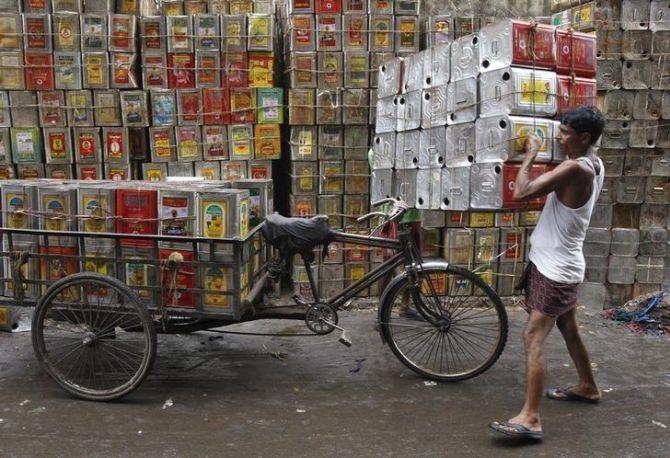The Cabinet on Wednesday approved the National Mission on Edible Oils – Oil Palm (NMEO-OP) with a financial outlay of Rs 11,040 crore to promote domestic cultivation of oil palm in the next five years, and reduce the country's dependence on edible oil imports.

The decision comes after Prime Minister Narendra Modi announced the new central scheme on August 15 during his Independence Day speech at Red Fort.
Briefing the media, Union Information and Broadcasting Minister Anurag Thakur said the Cabinet approved the NMEO-OP with a focus on the northeast region and the Andaman and Nicobar Islands with a financial outlay of Rs 11,040 crore.
Of the total outlay, Rs 8,844 crore would be the central government's share while Rs 2,196 crore would be states' share.
This includes the viability gap funding also, an official statement said.
The new scheme will subsume the current National Food Security Mission-Oil Palm programme.
Agriculture Minister Narendra Singh Tomar said the new scheme aims to cover oil palm in an additional area of 6.5 lakh hectare by 2025-26 and thereby reaching the target of 10 lakh hectares.
With this, the domestic production of crude palm oil (CPO) is expected to go up to 11.20 lakh tonnes by 2025-26 and up to 28 lakh tonnes by 2029-30.
Stating that the new scheme addresses several challenges faced by farmers, the minister said oil palm cultivation has been happening in the last few years and is being undertaken in 12 states at present.
"Since oil palm cultivation takes at least 5-7 years to give yield and profits.
"It was not possible for small farmers to wait for this long. Even if farmers were successful in cultivation, they were unsure of getting returns due to fluctuation in prices," he said.
At present, only 3.70 lakh hectares is under oil palm. Although there is scope for oil palm cultivation in the north east, it was not happening in the absence of processing industry and investment, he added.
Keeping this in view, Tomar said the government has decided to give assistance under the NMEO-OP to further boost cultivation of oil palm.
For the first time, the government will give a price assurance to the oil palm growers producing Fresh Fruit Bunches (FFBs).
This will be known as the 'viability price', he said.
The 'viability price' will be the annual average CPO price of the last five years adjusted with the wholesale price index to be multiplied by 14.3 per cent, he said, adding that this will be fixed yearly for the oil palm year (November to October).
"This assurance will inculcate confidence in the Indian oil palm farmers to go for increased area and thereby more production of palm oil," he said.
An official statement also said a formula price will also be fixed which will be 14.3 per cent of CPO and will be fixed on a monthly basis.
The viability gap funding will be the viability price-formula price and if the need arises, it would be paid directly to the farmers accounts in the form of direct benefit transfer, it added.
Further, the assurance to farmers will be in the form of the viability gap funding and the industry will be mandated to pay 14.3 per cent of the CPO price which will eventually go up to 15.3 per cent.
There is a sunset clause for the scheme which is November 1, 2037.
To give impetus to the North-East and Andaman, the government said it will additionally bear a cost of 2 per cent of the CPO price to ensure that farmers are paid at par with the rest of India.
The states which adopt the mechanism would benefit from the viability gap payment proposed in the scheme and for this they will enter into memorandum of understanding (MoUs) with the central government.
The second major focus of the scheme, Tomar said, is to substantially increase the assistance of inputs.
The assistance to oil palm growers for planting material has been increased from Rs 12,000 per hectare to Rs 29,000 per hectare.
Further, substantial increase has been made for maintenance and inter-cropping interventions, he said.
"A special assistance at Rs 250 per plant is being given to replant old gardens for rejuvenation of old gardens," Tomar said.
To address the issue of shortage of planting material in the country, seed gardens will be provided assistance up to Rs 80 lakhs for 15 hectare in the rest of India and Rs 100 lakhs for 15 hectare in North-East and Andaman regions.
An assistance of Rs 40-50 lakhs is given for seed gardens. Special assistance will be given to the North-East and the Andaman regions for half moon terrace cultivation, bio fencing and land clearance along with integrated farming.
For capital assistance to the industry for the North East states and Andaman, the scheme provides Rs 5 crore for setting up of a unit with 5 tonne per hour with pro-rata increase for higher capacity, he said, adding that this will attract the industry to these regions.
Asked why the government was promoting oil palm instead of oilseeds, the minister said there has been constant efforts to boost production of oilseeds like sunflower.
While the yield of oilseeds has been increasing, there was a need to focus on crops which gives higher productivity to bridge the supply-demand gap in the country at the earliest.
Oil palm produces 10 to 46 times more oil per hectare compared to other oilseed crops and has a yield of around 4 tons oil per hectare.
Thus, it has enormous potential for cultivation, he said.
The ICAR study said that oil palm can be cultivated in 28 lakh hectare in the country, out of which more than 9 lakh hectare in the north eastern region, he added.
"We are importing edible oils to meet the domestic demand. Maximum CPO is imported.
"Its share is 56 per cent in total edible oil imports at present," Tomar said the new scheme aims to reduce dependency on imports.
The new scheme will immensely benefit the oil palm farmers, increase capital investment, create employment generation, shall reduce the import dependence and also increase the income of the farmers, he added.
India meets about two-thirds of its edible oil demand through imports.
Photograph: Rupak De Chowdhuri/Reuters











 © 2025
© 2025